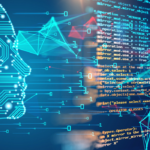Artificial Intelligence (AI) has transformed from a concept in the realm of science fiction to an everyday reality impacting every facet of our lives. The journey of AI has been marked by significant milestones and breakthroughs, each reflecting the convergence of theoretical foundations, technological advancements, and practical implementations.
The Early Conceptualization of AI
The roots of AI can be traced back to antiquity, with philosophers attempting to explain the human mind as a symbolic system. However, the formal inception of AI as a field of study began in the mid-20th century. Visionaries like Alan Turing and John McCarthy laid the groundwork for AI research, formulating concepts like the Turing Test and developing the programming language Lisp.
The Birth of AI Research
In 1956, the Dartmouth Conference marked the official birth of AI as an academic discipline. Researchers aimed to create machines capable of performing tasks that would require human intelligence. Early AI systems were rule-based and could perform specific tasks, but they lacked the ability to learn and adapt.
The Evolution of AI: Key Milestones
The 1970s: Expert Systems
One of the first significant milestones in AI development was the creation of expert systems in the 1970s. These systems, such as Dendral and MYCIN, were designed to mimic the decision-making abilities of human experts in specific domains. They marked a shift in AI research towards solving practical problems.
The 1980s: The AI Boom and Winter
The 1980s saw a surge in AI research and funding, driven by the promise of intelligent machines. However, the hype was followed by a period of disillusionment known as the AI winter, characterized by reduced funding and progress due to unmet expectations and technological limitations.
The 1990s: Machine Learning and Neural Networks
The 1990s brought a renewed interest in AI with the advent of machine learning and neural networks. These technologies enabled AI systems to learn from data and improve their performance over time. The development of more powerful microprocessors facilitated complex computations, leading to significant advancements in AI capabilities.
The Modern Era: AI in Everyday Life
Today, AI is an integral part of our daily lives, from virtual assistants like Siri and Alexa to recommendation systems on platforms like Netflix and Amazon. AI technologies such as natural language processing, computer vision, and deep learning have revolutionized various industries, including healthcare, finance, and transportation.
AI and Ethics
As AI systems become more autonomous, ethical considerations surrounding AI bias, job displacement, and privacy have come to the forefront. Responsible AI development is crucial to ensure that AI technologies are used for the benefit of society.
“The development of full artificial intelligence could spell the end of the human race.”
Stephen Hawking
The Future of AI: Trends and Predictions
The future of AI holds immense potential, with ongoing research focused on achieving artificial general intelligence (AGI) and addressing ethical challenges. Emerging trends include the integration of AI with other technologies like blockchain and quantum computing, which could further enhance AI capabilities.
AI in Healthcare
AI is poised to transform healthcare by enabling personalized medicine, improving diagnostic accuracy, and optimizing treatment plans. AI-powered tools can analyze vast amounts of medical data to identify patterns and predict patient outcomes.
AI in Autonomous Systems
Autonomous vehicles and drones are becoming increasingly sophisticated, thanks to advancements in AI. These technologies have the potential to revolutionize transportation and logistics, making them safer and more efficient.
Conclusion
The journey of artificial intelligence from concept to reality has been a remarkable one, marked by significant milestones and transformative impacts. As AI continues to evolve, it is essential to address the ethical and societal challenges that arise, ensuring that AI technologies are developed and deployed responsibly. The future of AI holds immense promise, and its continued evolution will undoubtedly shape the world in profound ways.








